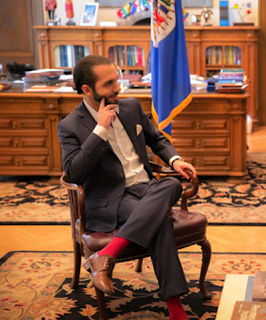Francisco Flores, former president of El Salvador, dies
Former Salvadoran president Francisco Flores died today , after going into a coma a week ago when he suffered a cerebral hemorrhage. His death came in the middle of his prosecution for corruption charges based on revelations that he had misappropriated $15 million in earthquake relief funds and used them for political purposes. Flores was El Salvador's president from 1999-2004, elected on the ticket of the right wing ARENA party. His time in office included the change of the country's currency to the US dollar, two massive earthquakes in 2001, attempts to privatize various public sector services, a close relationship with the Bush administration, and rising gang violence. From the AP report of his death: Flores had a meteoric rise to the presidency, but once there gained a reputation for being arrogant and distant from his people. He became El Salvador’s first president to be charged and put on trial for acts of corruption during his time in office. “Th...

